Oleksandr Pasichnyk has been working in journalism for 43 years. For the past nine years, he has been the editor of the city district newspaper Zoria in the town of Lyman, Donetsk Oblast. He has despised war since childhood, as he heard many horrifying stories about it from his parents, who were war veterans. However, he never thought he would see his city in ruins and that a photo of his own apartment would be featured as a striking illustration of the terrible destruction.
“Self-declared Donetsk Peoples Republic checkpoints surrounded Lyman all this time.”
Oleksandr is one of those early risers who greet the first rays of the sun, an early bird. So, on February 24th, at six in the morning, he was already heading to the editorial office when he suddenly noticed that people around him were agitated and scared.
Oleksandr Pasichnyk arrived at the editorial office at 6:30 AM, where people were already asking about the war. He couldn’t believe it, so he contacted authoritative sources to confirm. Unfortunately, it was true—the war had begun. Despite their eight years of mental preparation for a potential large-scale war due to their proximity to self-declared Donetsk People’s Republic (DPR) checkpoints, the actual outbreak of war was shocking and unexpected.
Despite the frontlines approaching, the Zoria editorial team continued publishing their newspaper in February and March, maintaining their usual twice-weekly schedule. Their final issue before the occupation was on April 2nd. Oleksandr Pasichnyk had to suspend the magazine’s publication on the same day due to Russian rocket attacks on residential areas. He left the city with his wife and seriously ill father-in-law, packing only what could fit into two suitcases. Other journalists also left, some staying within Ukraine and others going abroad. To stay connected, they established a daily morning call routine to check on each other and share updates. Despite being internally displaced and traveling to different regions, Pasichnyk remained committed to his homeland.
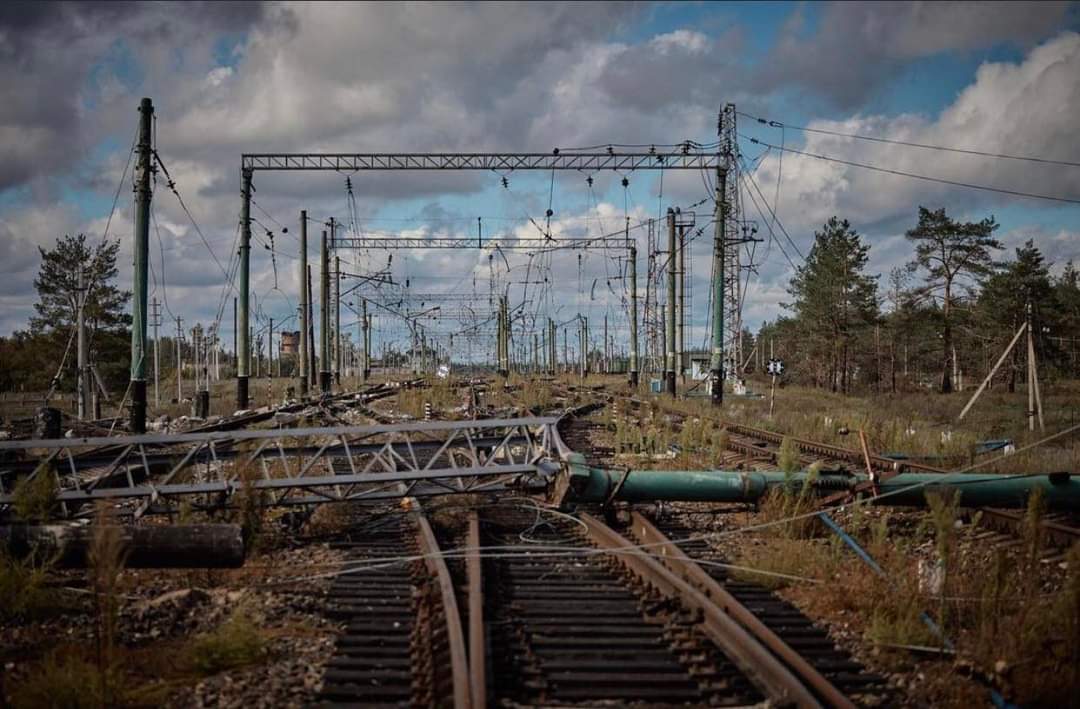
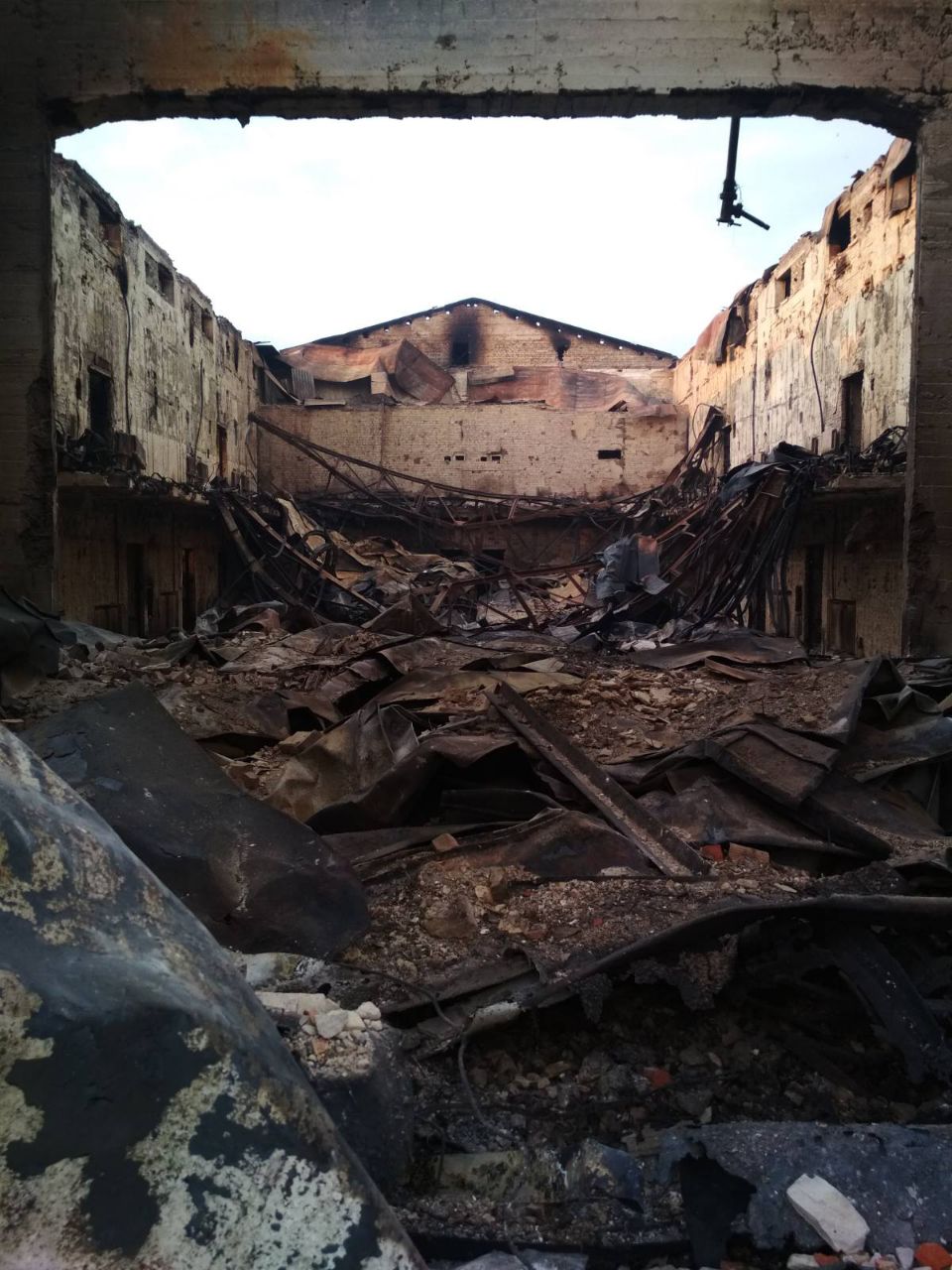
– I personally have never left Ukraine and will never leave! – Pasichnyk is convinced. – But there was never any thought of staying in the occupation. Who would serve those beasts? The words of the Russian poet and diplomat Griboedov persistently come to mind: ‘I’d rather serve, it’s sickening to be a servant.'”
Only ruins remained of the housing.
Ukrainian forces officially raised the blue and yellow flag over Lyman on October 4th. At that time, the city lay in ruins and was nearly deserted. Of the more than 40,000 people who lived in the Lyman territorial community before the war (the city of Lyman and 39 small settlements), only about 12,000 remained. Not a single building in Lyman survived intact. This was especially painful because the destruction caused by the hostilities in 2014 had been repaired: buildings, bridges, and roads had been modernized. At that time, the city received a new impetus for life and development but then came February 2022…
In the fall, as Russian forces retreated, they continued to shell Lyman. On the early morning of November 7th, a rocket struck a nine-story building where the editor-in-chief of Zoria used to live. One entrance completely collapsed, and the apartments in the other were so destroyed that it was impossible to live there anymore. Among them was Pasichnyk’s apartment.
– At 5:40, they shelled the building, and at 7:00, someone from Lyman called me and sent photos of the apartment, or rather, what was left of it. A picture of this horror was later widely circulated on many Ukrainian television channels – the journalist recalls with pain.
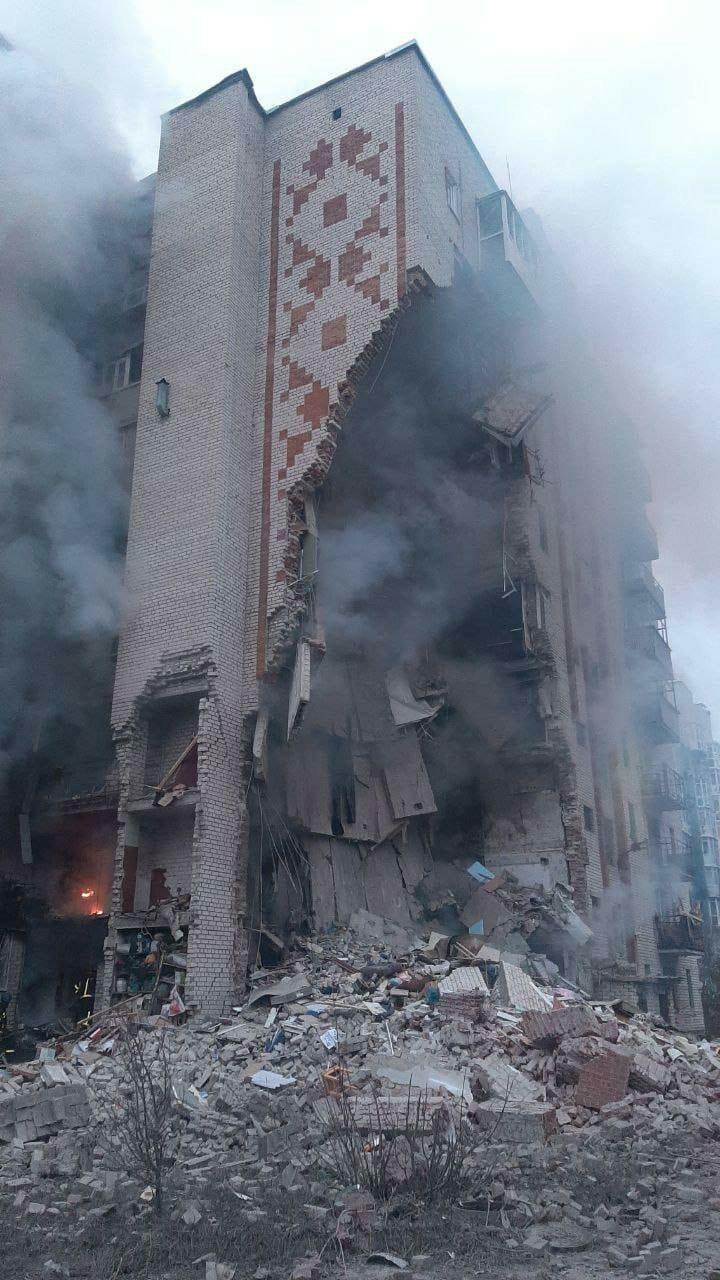
The Pasichnyk family lived in this apartment for 30 years. They had done significant renovations in 2021, but now, it’s all gone. They plan to file for compensation due to the destruction, gathering evidence and testimonies, but that’s for the future.
The editorial office endured significant damage. The Russian occupiers removed the Zoria newspaper sign, shattered all the windows, and looted everything inside, including furniture, a refrigerator, and even cups. The first issue after de-occupation was a collective effort by the entire team.
Photo: Among colleagues Oleksandr Pasichnyk at the “Donbas Media Forum” in Kharkiv. Pre-war photo. / Archive of Oleksandr Pasichnyk.
Oleksandr Pasichnyk continues his professional duties, and the revival of the newspaper serves as a unifying force for Lyman residents. The first post-de-occupation issue of Zoria was published on October 27th, thanks to financial support from the National Union of Journalists of Ukraine, who raised funds from international partners. This enabled the editorial office to use the Kramatorsk printing house, which had been inactive for months but was now back in operation. The chief editor personally wrote all the articles while in Kyiv, and local contributors, including railway workers, soldiers, law enforcement officers, doctors, bakers, and foresters from the Lyman community, provided information and photos from the field. Their established local network of contacts proved invaluable. Fortunately, there was still a stock of newsprint paper from pre-war times.
The edition was distributed in a circulation of 3,000 copies with the help of volunteers. They delivered the newspaper in the city and in the villages, along with food and essential items. The head of the Lyman city military administration, Oleksandr Zhuravlyov, also occasionally brought the publication to the people.
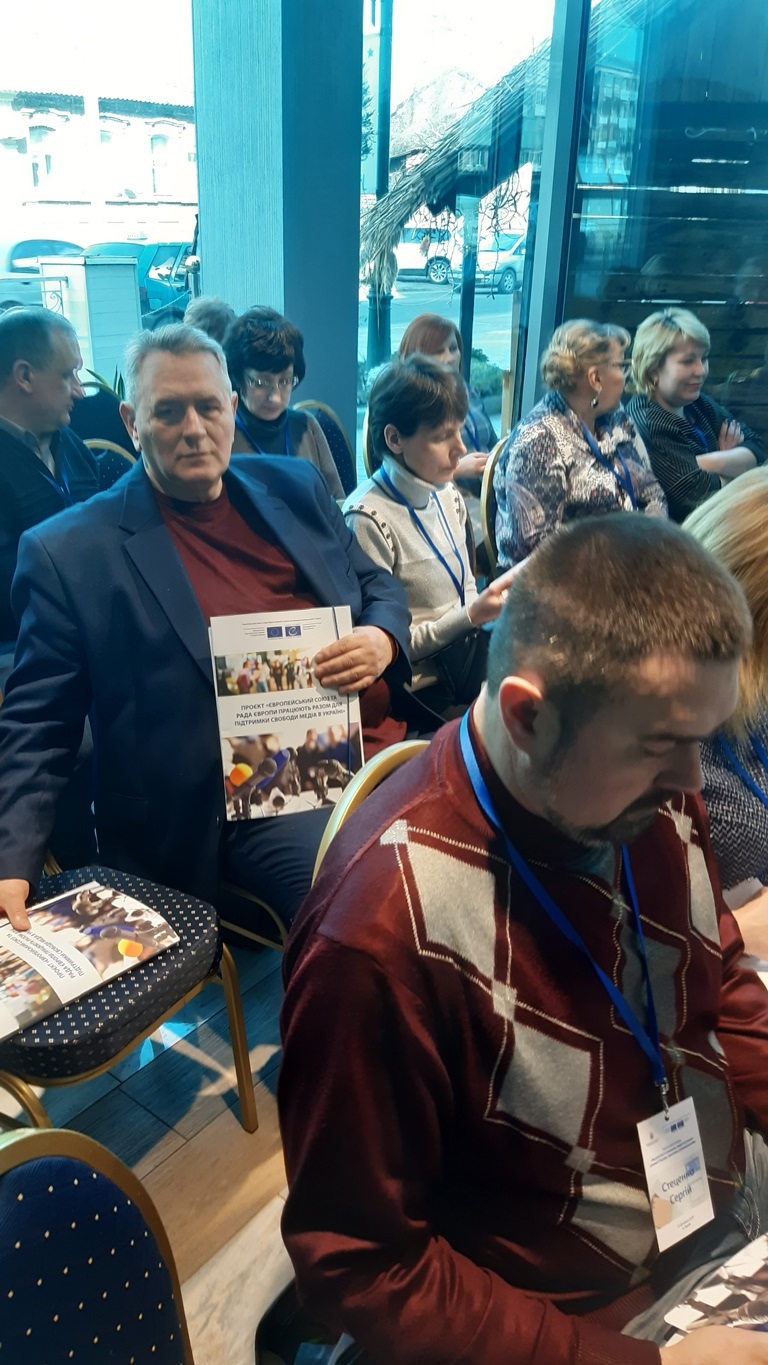
– People kissed the newspaper because they had lived almost half a year without Ukrainian information! Some of them caught a signal in the occupation by climbing to the ninth floor somewhere and called me, ‘Tell us what’s happening in Ukraine…’. After receiving the number, many readers called me with gratitude. Many Lyman residents now live all over Ukraine, so I send them copies by Nova Poshta. I also distribute it among our railway workers who moved to work in Kyiv.
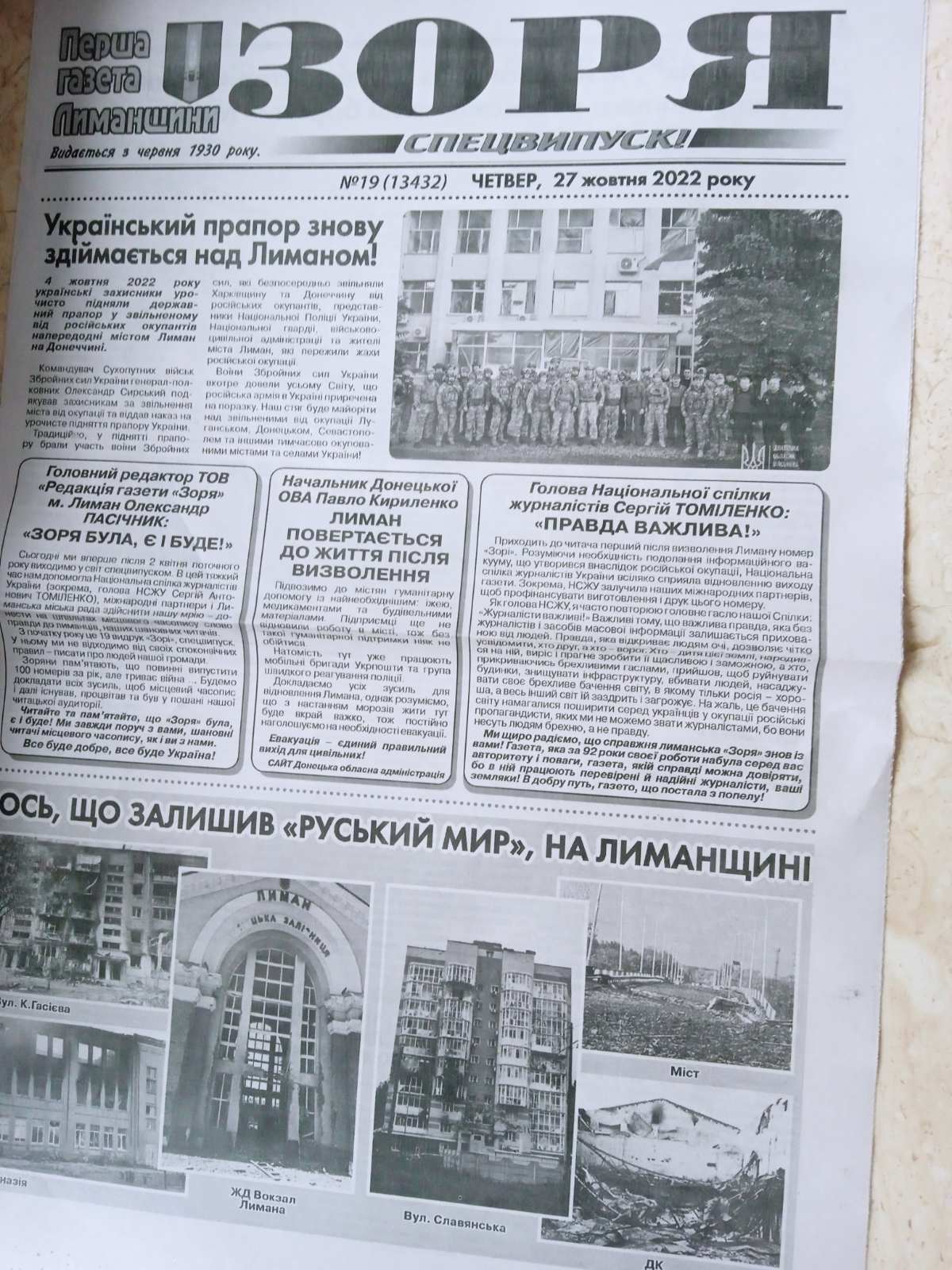
The second special issue was funded by the Lyman City Council and was released on November 30th with the same print run, distributed by volunteers. Both issues focused on the city’s recovery after the occupation and featured various heroes, including local authorities, military personnel, doctors, volunteers, builders, communicators, and bank employees, all contributing to the return of normalcy for Lyman’s residents. In mid-November, a district hospital with a five-bed day facility was reopened in Lyman, despite partial destruction and extensive looting in one part of the hospital.
The resumption of the hospital’s work was facilitated by the international organization Doctors Without Borders, and one of the publications in the second issue is dedicated to this.
Zoria through the tone of its materials, inspires hope for Ukraine’s victory in this terrible war. Oleksandr Anatoliyovych hates war because he grew up in a family of World War II veterans.
– My father received prestigious awards, including the Orders of Oleksandr Nevsky, the Red Star, the Order of the Patriotic War (both degrees), and medals for bravery and combat merit, – Pasichnyk shares from his autobiography. – My mother served as a searchlight operator, and they met in a hospital while recovering from severe injuries. They got married on June 2, 1945. This is an unforgettable story. That’s why I’m staunchly against war, violence, and this senseless bloodshed. Despite my experiences in the special forces of the internal troops, I’ve never witnessed anything like the current situation, and I hope to never see it. Therefore, I will continue my lifelong fight against war.
In the coming months, Pasichnyk plans to resume the regular monthly edition of Zoria. The publication of this newspaper, like several other local print media in the liberated territories of the East, is also financially supported by the National Union of Journalists of Ukraine.
This series, titled Executed Free Speech, is created as part of a project Drawing Ukrainian And International Audience’s Attention To Serious Violations Of Human Rights And Crimes Against Journalists And Mass Media By The Russian Federation, which is performed by the National Union of Journalists of Ukraine, with support from the Swedish non-profit organization Civil Rights Defenders.
JOURNALISTS ARE IMPORTANT. Stories of Life and Work in Conditions of War is a cycle of materials prepared by the team of the NUJU with the support of the Swedish human rights organization Civil Rights Defenders.
#CRD

 THE NATIONAL UNION OF
JOURNALISTS OF UKRAINE
THE NATIONAL UNION OF
JOURNALISTS OF UKRAINE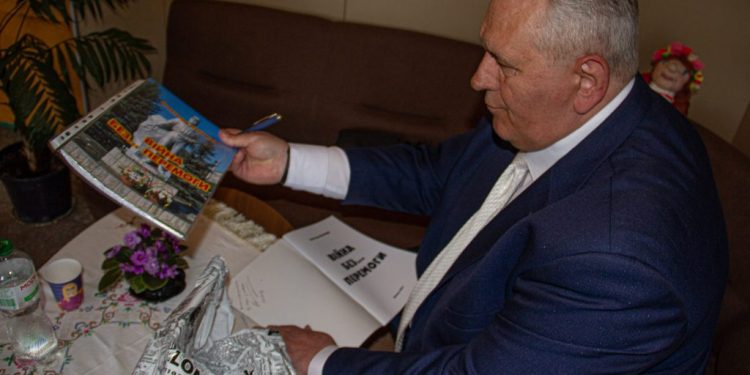
















Discussion about this post